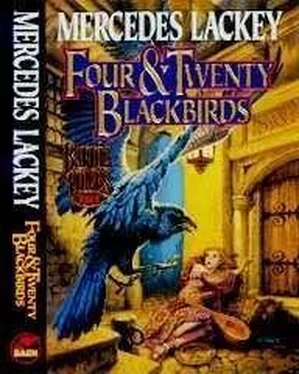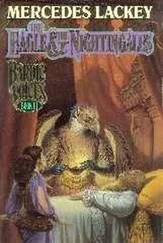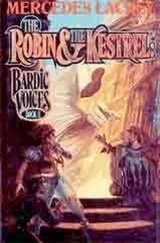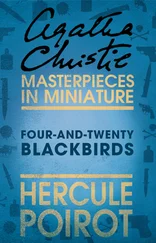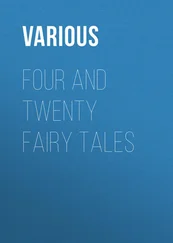Mercedes Lackey - Four and Twenty Blackbirds
Здесь есть возможность читать онлайн «Mercedes Lackey - Four and Twenty Blackbirds» весь текст электронной книги совершенно бесплатно (целиком полную версию без сокращений). В некоторых случаях можно слушать аудио, скачать через торрент в формате fb2 и присутствует краткое содержание. Жанр: Фэнтези, на английском языке. Описание произведения, (предисловие) а так же отзывы посетителей доступны на портале библиотеки ЛибКат.
- Название:Four and Twenty Blackbirds
- Автор:
- Жанр:
- Год:неизвестен
- ISBN:нет данных
- Рейтинг книги:5 / 5. Голосов: 1
-
Избранное:Добавить в избранное
- Отзывы:
-
Ваша оценка:
- 100
- 1
- 2
- 3
- 4
- 5
Four and Twenty Blackbirds: краткое содержание, описание и аннотация
Предлагаем к чтению аннотацию, описание, краткое содержание или предисловие (зависит от того, что написал сам автор книги «Four and Twenty Blackbirds»). Если вы не нашли необходимую информацию о книге — напишите в комментариях, мы постараемся отыскать её.
Four and Twenty Blackbirds — читать онлайн бесплатно полную книгу (весь текст) целиком
Ниже представлен текст книги, разбитый по страницам. Система сохранения места последней прочитанной страницы, позволяет с удобством читать онлайн бесплатно книгу «Four and Twenty Blackbirds», без необходимости каждый раз заново искать на чём Вы остановились. Поставьте закладку, и сможете в любой момент перейти на страницу, на которой закончили чтение.
Интервал:
Закладка:
That gave Orm another idea; he went out and purchased a change of outer clothing—this time something less threadbare, but all in black, like one of Shensi's artistic friends—a graphite-stick, and one of those inexpensive blank books. He returned to the inn, got another table near Tal Rufen, and ordered a hot drink.
When the drink arrived, he took turns sipping it, staring into space, and scribbling frantically in the book. After one amused look, the serving-wench left him alone. It would have been obvious to any dolt that Orm was—supposedly—composing something, probably poetry, and probably bad poetry. In actuality, he was writing down everything Tal Rufen wore, ate, drank, used, and said, in something that looked very like blank verse. Orm knew from experience that between his abbreviations and his tiny, crabbed, slantwise letters, no one could read his handwriting except himself, so he had no fears that one of the serving-girls might get curious and read something she shouldn't.
He'd used this particular ruse more than once in his career, but never had it been more useful than now. So long as a place wasn't jammed with people, and so long as he kept paying for frequent refills of his cup, no one minded a mad poet taking up a little table-space. He was clean, moderately attractive, and he gave the serving-wenches something to giggle about. None of them would make overtures towards him, of course—as a class, serving-girls were sturdily practical little things, and had no time in their lives for a—probably impoverished—poet. Any flirting they did would be saved for someone with a steady job and enough money in his pocket to buy more than an endless round of tea.
He continued the pretense of being a writer for as long as Tal Rufen interviewed people who had been present at the kill; pretended fits of thought gave him the opportunity to stare at the Church constable or anyone else for as long as he liked without anyone taking offense, because it looked as if he was staring blankly into space, and not actually at anyone. The serving-girls found it amusing or touching, according to their natures. Tal Rufen noticed, then ignored him, precisely as Orm had hoped. The last thing that a constable of any kind would expect would be that a man he was trying to track down would come following him , so Rufen paid no further attention to the "poet" at the corner table.
Orm was neither impressed nor amused by Rufen; he was adequate, certainly, and thorough, but hardly brilliant. In his opinion, there was nothing really to fear from this man except his persistence.
Orm took care to leave first, when he sensed that Tal was about to wind up his interviews. He thanked his latest serving-girl shyly, picked up the bag that held his other clothing and stuffed his writing paraphernalia into it, and left. He ducked into the shelter of an alley and changed his coat back to that of the fisherman, pulled a different wool cap down over his head, and waited, bent over and tying a bootlace, for Tal to emerge from the tavern.
When the constable appeared, Orm gave him a little bit of a lead, then followed him. From the inn, Tal went back to the palace, got his horse, and returned to the Abbey without making a single stop along the way. By this time, it was late in the afternoon, and Orm doubted that Tal would be doing anything more until the morrow. It would, however, be an early day for him; most of the people associated with the Abbey rose before dawn, and he suspected that Tal Rufen would be no exception.
Orm took his time, getting himself a fine dinner, and only returning to his apartment after dark. Coming in through the back, he listened for sounds of Rand, but complete silence ruled the place. Rand could not walk up there in his current form without making scratching noises on the floor; either he was asleep, or out, and in neither case would he be aware that Orm was back. Orm grinned; let him assume that his employee was out keeping an eye on Tal Rufen all night; it would avoid an argument. Besides, the heavy meal made him sleepy, as he had hoped it would. He was going to have to get up with the dawn if he expected to catch Rufen on his way out tomorrow, and that meant he really ought to go to bed now if he expected to get a decent night's sleep.
The following day, at dawn, Orm was back on the bridge with a new fishing-line and bucket, and while he was waiting for Rufen to put in an appearance, he actually caught two fish! Both were river-salmon, large and fat, and he gave one to the toll-guard who'd passed him through the day before. Let the man think that it was out of gratitude; Orm wanted to have a reason for the man to think well of him and let him out on the bridge without question if he had to come back here anymore. He and the guard exchanged a few words—Orm sighed over the difficulties of finding work in the winter, complained about showing up where there was supposed to be some work this morning, only to find a dozen men there before him. The guard made sympathetic noises, and promised that Orm could fish without toll whenever he was out of work. This pleased Orm twice over—once that the guard would not be surprised if he didn't show up for a while, or indeed, ever again; and twice because he wasn't going to have to pay out toll-fees for the privilege of spying on that damned Tal Rufen.
This time when Rufen appeared, it was at the side of a woman that Orm assumed was High Bishop Ardis. He recognized Rufen at a distance just by recognizing the old gelding, and there was someone else there with him—someone obviously of very high position within the Justiciars. It was a woman, dressed in a fine cloak and robes of Justiciar red, and although she was not wearing the miter of the bishopric, she was wearing a scarlet skull-cap edged with gold under the hood of her scarlet cloak. She was also mounted on a fine white mule, and most of the Justiciars rode very ordinary-looking beasts when they left the Abbey. Given all of those factors, it would have been more surprising if the woman hadn't been Ardis.
Orm followed them discreetly, but they went straight to the headquarters of the Kingsford constables, and from there to the Ducal Palace again. Both were places he couldn't go, so he loitered in the freezing cold until they came out again. They went straight back to the Abbey, and did not emerge again that day.
Uneventful—except that by seeing them together, Orm had actually established that Tal Rufen was acting for the High Bishop and as her assistant as well as her personal guard. If she'd had any other assistant, there would have been three or four people going across the bridge to Kingsford. That was useful information, and Rand would be pleased to have it.
The Black Bird was waiting for him this time, and from the look of him, was a bit impatient. Orm heard him scrabbling about upstairs as he paced, and went straight to his room as soon as he changed, with his notebook tucked under one arm. Rand's eyes grew alert at the sight of it. With talons instead of hands, of course the Black Bird was unable to read these things for himself, so Orm read to him from his own notes. The Bird's eyes grew very bright, and when Orm was done, he gave a cawing laugh.
"Good!" he said. "Very good! Excellent, in fact. You don't need to follow Tal Rufen for the present, Orm. I might ask you to resume later, but for now, the next couple of days, we can concentrate on other things. For one thing, there are some odd articles I'd like for you to get for me. One or two of those Deliambren pens, for instance; I'm aware that they'll be difficult to obtain, so make a concerted effort to get them."
Baffled, Orm nodded. I suppose that Rand is trying to find a way to take Rufen out of this equation. That makes sense; by now it certainly seems that Ardis is the main force behind investigating the kills. Without her pursuit of the case, it won't get very far. Without Rufen, Ardis will be effectively without hands and feet. The Bishop can't move around the streets unobtrusively, and she certainly can't interview the kinds of people I saw Rufen talking to today.
Читать дальшеИнтервал:
Закладка:
Похожие книги на «Four and Twenty Blackbirds»
Представляем Вашему вниманию похожие книги на «Four and Twenty Blackbirds» списком для выбора. Мы отобрали схожую по названию и смыслу литературу в надежде предоставить читателям больше вариантов отыскать новые, интересные, ещё непрочитанные произведения.
Обсуждение, отзывы о книге «Four and Twenty Blackbirds» и просто собственные мнения читателей. Оставьте ваши комментарии, напишите, что Вы думаете о произведении, его смысле или главных героях. Укажите что конкретно понравилось, а что нет, и почему Вы так считаете.
